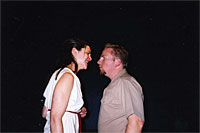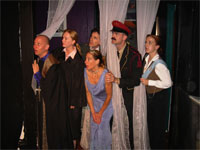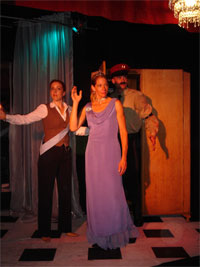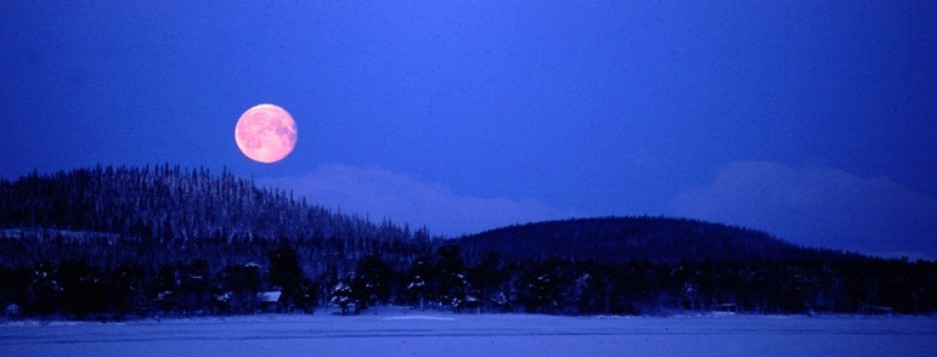category: full-length one act
genre: tragi-comic parody
running time: one hour and thirty minutes
setting: in and around a brothel in an unnamed city
period: post-contemporary
characters:
Yvette, the madam of a brothel
Armand, her lover, a prostitute
Bianca, her assistant, a former-prostitute
Rusalka, a beautiful prostitute
Jean, the new boy
Chantal, a former prostitute turned revolutionary
Eilif, her lover, a leader of the people
George, the chief of a police
A Bishop, who is really an undertaker
A General, who is really a reporter
A Judge, who is really a doctor
Tony, the royal envoy
story:
In an unknown city a revolution is raging led by the plumber turned intellectual, Eilif, and his lover, the former prostitute Chantal, who keeps the people inspired with her singing of old hymns and standards. Eilif’s nemesis, the chief of police, George, is leading the counter-revolution from a brothel where his former lover, Yvette, rules over a group of prostitutes who specialize in realizing sexual fantasies for top tier professional clients, some of whom like to impersonate heads of state. When Chantal and her gang blow up the palace, effectively killing all the real heads of state, Tony, the last true nobleman, arrives at Yvette’s with a scheme to take back the city using her as a decoy for the slain Queen. Spurred by her unrequited love for George, Yvette agrees to the trick, roping in some of her loyal clients, and during a public appearance Chantal is assassinated. In the wake of her death the revolution falls apart and Eilif commits suicide, effectively erasing any memory of Yvette’s former life as a madam, but George’s obsession with his own heroic fame effectively prevents their romantic reunion. Alone and abandoned, except for the manipulative and unpredictable Tony, Yvette mourns her losses until it is revealed that the story presented is, in fact, a rehearsal for one more twisted fantasy in her whorehouse.
author’s comments:
As the story suggests, this is pretty freely adapted from Jean Genet’s The Balcony, which due to some literary law clause is not up for re-translation despite the fact that Genet himself is two decades dead and left no heirs. So, forced to write my own version, I found I ended up liking it better anyway, because as much fun as Genet’s concept is, and as ground-breaking as his structure was back in the day, The Balcony isn’t really all that satisfying for me as a play since it lacks character arcs, continuity, and other elements that my rendering sought to bring to it. Along the way I cut characters, combined them, completely reconstructed them, changed their sex, created whole new scenes, and added, what I hope, was some much needed emotional center to the work, namely in the form of Yvette’s hopeless love for George, Eilif’s hopeless love for Chantal, and Bianca’s personal struggle with her own soul in the wake of a truly meaningful experience. George and Chantal retained their names from the Genet as a bow to their predecessor, Chantal because she is the only character who really made it out of the previous work looking anything like her ancestor, and George because I wanted to satirize George W. Bush and Tony Blair- who gave his name to my version of The Envoy. Though never really a political writer, this show did give me my chance to wade a bit into those murky realms while still retaining my safety hallmarks of surrealism and romantic poetry- in some ways, even letting me run wild with those elements in a way I had never done before. I also think I got to be funny in a whole new vein and for that I really am indebted to Genet and his concept of political figures replaced by the lowest levels of society. In my version, though, they aren’t all proletariat- the three figures are, in fact, all professionals, because to me that’s more interesting, since professionals in modern day America seem to be exceptionally good at avoiding reality and constructing little worlds for themselves- which for me is what the play is all about. The final coup de theatre that finishes off Troijka is also my best innovation, since it brings home the idea that even the arts are a type of escape, which is not something I necessarily agree with but it’s an interesting concept to put out there since almost everything else in life is nailed somewhere along the way. My most emotionally distant piece, it’s also probably my least likely to be performed, especially if Genet’s work ever does go public domain, but I’m very glad I wrote it. The dialogue is good and it taught me a lot of things about looking at the world from a cynical, mocking angle I don’t normally take.
Productions:

No Nude Men Productions, February 12, 13, 14, 19, 20, 21, 26, 27 & 28, 2004, Spanganga Theater in San Francisco, California. Directed by Stuart Bousel; Costumes by Amy Seimetz; Lighting by Christopher Rader; Sound by Lisa Fowle; Additional Material by Miranda Calderon. Cast: Michaela Greeley (Yvette), Ryan Hayes (George), Wylie Herman (Tony), Lily Oglesby (Bianca), Daniel Bridges (Eilif), Miranda Calderon (Chantal), Warden Lawlor (The General), Lisa Swanson (The Judge), Jesse Baldwin (The Bishop), Chris Kelly (Armand), Nirmala Nataraj (Rusalka), Ronn Vigh (Jean)

No Nude Men Productions, July 13, 14, 15, 20, 21, 22, 27, 28, 29, August 3, 4 & 5 2006, Climate Theater in San Francisco, California. Directed by John Dixon; Costumes by Jessica Kuper; Lighting by Christopher Rader; Scenery by Christopher Rader; Sound by David Mahr; Stage Managed by Christopher Rader; Additional Material by Miranda Calderon. Cast: Michaela Greeley (Yvette), Chris Kelly (George), Gina Seghi (Tony), Meghan Kane (Bianca), Lee Marcotte (Eilif), Margery Fairchild (Chantal), Kevin Copps (The General), Lisa Swanson (The Judge), David Bicha (The Bishop), Chris Carlone (Armand), Emily Morrison (Rusalka), Carlos Barrera (Jean)

